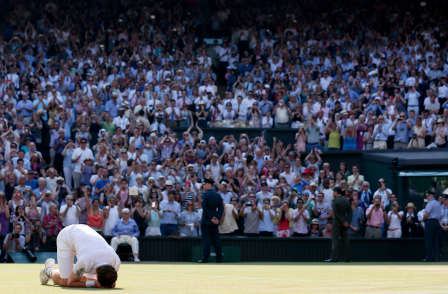
Andy Murray winning Wimbledon was more than just a sports story. Splashed across every national newspaper front page, it has proved one of the biggest news stories of the year.
With the huge national attention (the BBC One broadcast was seen by more than 17m people), it proved a challenging day for Press Association, as the demand for copy from news organisations – newspapers, websites and broadcasters – proved insatiable.
PA had nearly 20 journalists and photographers working directly on Sunday’s final, with 11 present at the All England Club. It also had a journalist and a reporter in Murray’s hometown, Dunblane, and a journalist at one of the big television boards in London. PA even had a Lobby journalist on hand to get politicians’ reactions.
Among the PA reporters at Centre Court on the Sunday afternoon was Ellen Branagh. As chief reporter, she was looking beyond the sport – “it is not about the strength of Murray’s forehand, it is more about the overarching story”.
In forming the greater story, it was Branagh’s job to speak to the likes of David Cameron, Murray’s family and the fans, both inside Centre Court as well as on Henman Hill (or Murray Mound, as Branagh now calls it).
She admits that the coverage threw up a unique issue for her as a news reporter – an apparent bias towards Murray.
“It is difficult,” says Branagh. “Obviously at PA there is a massive emphasis on objectivity, but you are trying to capture the feeling of the nation.
“Everyone was saying this is amazing and we want him to win. I suppose you are reflecting the mood of the public that is what it was… People felt great across the nation.”
With at least eight reporters out of the office – in Wimbledon, London and Dunblane – PA certainly gathered plenty of opinion and reaction. But Branagh insists the level of coverage was appropriate.
Asked how much of Monday’s newspaper coverage was from PA copy, Branagh estimates “a lot” – highlighting in particular exclusive quotes from Murray’s mother.
“All the national newspapers had staff reporting Wimbledon, but I know that there were things they were taking from our copy,” she says.
Asked to be more specific, Branagh says it is hard to tell, because she and her colleagues do not get bylines.So despite working throughout Saturday and Sunday, and having the pressure of needing to be first to the stories, Branagh and fellow PA journalists do not get publicly recognised.
“It is something that you have to accept when you are part of an agency,” she says. “It can be frustrating at times but you know what you did and you know which part of it is yours. And the reporter knows and the news editor knows. So I think it is one of those things that you have to console yourself knowing that you did good.”
Email pged@pressgazette.co.uk to point out mistakes, provide story tips or send in a letter for publication on our "Letters Page" blog
